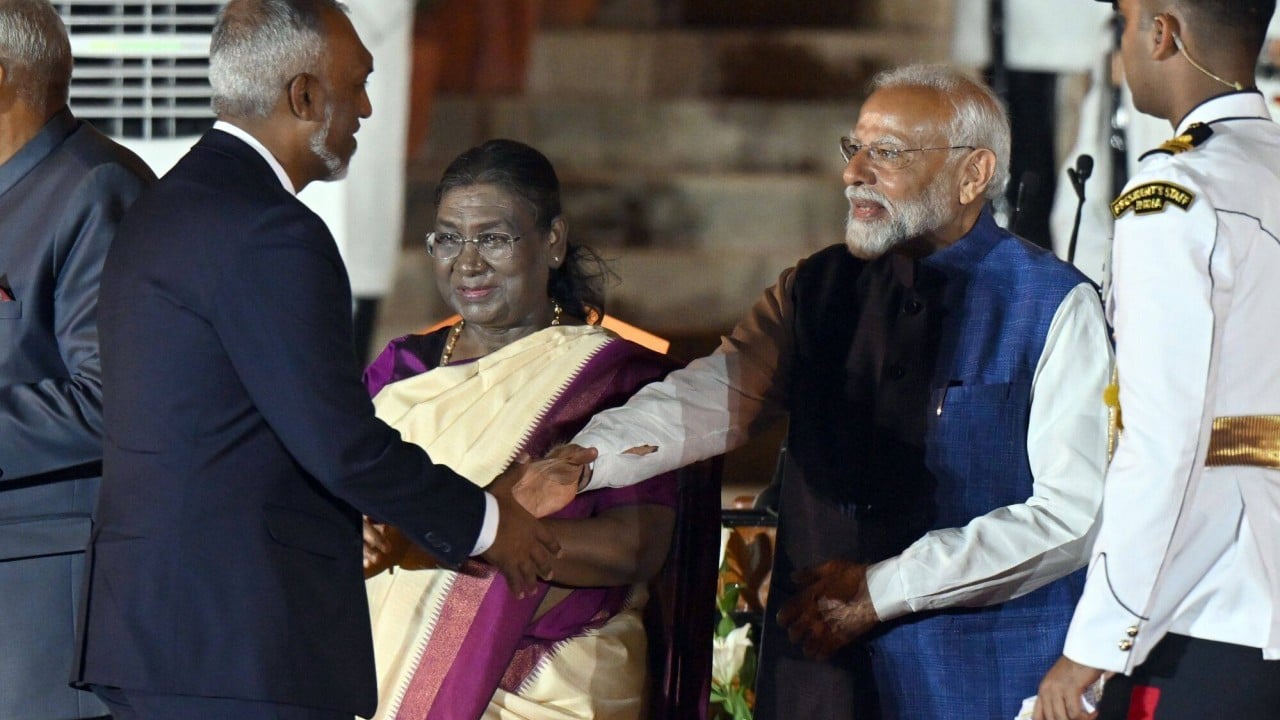The Maldives appears keen to reset strained relations with India in a move that analysts say is aimed at helping its key tourism industry recover following a steep decline in visitors from its neighbour.
India’s Foreign Minister Subrahmanyam Jaishankar said he was “committed to deepen India-Maldives ties” during a visit over the weekend to the Maldives, where he met President Mohamed Muizzu.
This was Jaishankar’s first trip to the archipelago nation after Muizzu, who came to power last year on an anti-India and pro-China electoral campaign, expelled Indian troops from his country in May and his administration signed a military assistance pact with Beijing in March.
Analysts say the visit by Jaishankar shows the two countries are keen on mending their relationship.
The Muizzu administration had adopted a more accommodating stance towards New Delhi’s concerns after the Maldives’ parliamentary elections, reflecting Malé’s recognition of the risks of jeopardising the long-standing bilateral relationship, said Aditya Gowdara Shivamurthy, an associate fellow at the Delhi-based Observer Research Foundation’s strategic studies programme.
“We are perhaps seeing a reconciliatory approach from Maldives … India has shown that it is accommodative towards Maldives’ new administration even in the face of the Muizzu administration’s anti-India rhetoric,” he said.

In May, Maldivian Foreign Minister Mooza Zameer travelled to Delhi for discussions on matters of “mutual interest”. Last week, Maldivian Tourism Minister Ibrahim Faisal met his Indian counterpart Gajendra Singh Shekhawat in the Indian capital to explore boosting tourism flows between the two nations.
Tourism woes
According to Maldives tourism data, India was the top market for inbound tourism in 2023, with 11.1 per cent of total visitors. But India dropped to sixth place with 6.1 per cent of the market share from this year up to July.
Conversely, China – ranked third in 2023 – took the top spot over the same period, with 13 per cent of total visitors.
Jyoti Mayal, president of the Travel Agents Association of India, said the previous diplomatic fallout between the countries was a “very crucial” factor behind the steep decline in Indian tourists to the Maldives.
Tensions boiled over in January after Maldivian ministers made derogatory comments about Indian Prime Minister Narendra Modi’s social media posts promoting domestic tourism in the Lakshadweep archipelago, a group of Indian islands near the Maldives.
The remarks prompted Modi supporters and some celebrities to call for a tourism boycott, which experts say has discouraged Indian nationals from visiting the Maldives.
“Positive diplomatic engagements and resolutions of any ongoing issues would help to restore confidence among the Indian travellers, especially the ones who have taken this [issue] to heart,” Mayal said.
“We as travel agents always feel sad that it is the tourism industry that is always impacted by these political issues.”

Tourism accounts for 25 per cent of the Maldives’ gross domestic product, making it critical for its earnings, according to Swaran Singh, professor of international relations at Jawaharlal Nehru University in New Delhi.
It is unclear what the near-term financial impact on the Maldives is from the projected drop in Indian visitors – India contributed around US$380 million of tourism revenue to the island nation last year.
Analysts warn a continuous drop could have far-reaching implications for the Maldivian economy, which is why Malé is likely keen on rebuilding the bilateral relationship.
“The broader calculation for the Maldives is that it wants the scepticism from Indian tourists to fade away,” Shivamurthy said.
“While political leadership may change, tourist organisations in the Maldives recognise the importance of the Indian market and the need to leverage their once-close relationship to regain business from this massive market,” he said.
Tilt towards China
India has signalled that it does not hold a grudge against the Maldives, as evidenced by Modi’s invitation to Muizzu to attend his swearing-in ceremony in Delhi in June after he won a third consecutive term as prime minister, analysts say.
For India, the importance of the Maldives lay in its strategic location in the Indian Ocean region in line with its “neighbourhood first” policy, Singh said.
This has become increasingly important as China endeavours to enhance its geopolitical footprint in the Indian Ocean region and ties with India’s neighbours, which has sparked concerns in Delhi, he added.
“President Muizzu has shown a clear tilt in favour of Beijing where he had chosen to visit first and sign several maritime, marine, security and defence cooperation agreements,” Singh said.
“India is aware of that reality and has managed to bring India-Maldives ties back to the even keel.”

The Maldives is cognisant of the need to avoid becoming beholden to either China or India and is hoping to maintain a safe distance from both powers, according to analysts.
The Maldives had switched to a pragmatic approach in its ties with India after adopting a strong pro-China stance, Singh said. This change is reflected in recent speeches by Muizzu and increased engagements between Delhi and Malé.
The Maldives’ geographic proximity to India and its vital economic ties with Delhi meant Malé could not afford to significantly damage their relationship, he added.
Shivamurthy said the relationship was multifaceted beyond tourism or defence. Both countries recognised it was in their best mutual interest to preserve the relationship, he added.
“India has been one of the biggest development partners for Malé and every time there has been a crisis in the Maldives, India has stepped up.”


